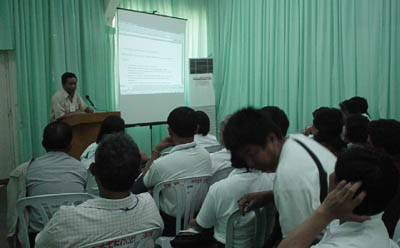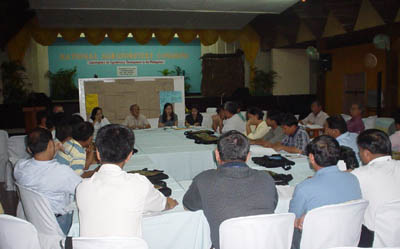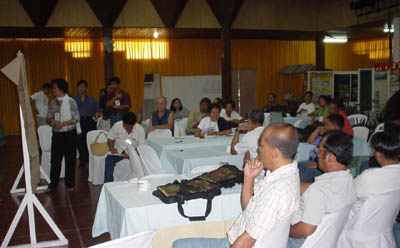Leila D. Landicho ([email protected])
Participants in the Philippines’ First National Agroforestry Congress, held late last year at the Leyte State University in Leyte, Eastern Visayas, gathered to strategize the advancement of agroforestry in the country.
The congress was organized by the National Agroforestry Committee (NAC), a multi-agency group consisting of the World Agroforestry Centre (ICRAF)-Philippines, Department of Environment and Natural Resources (DENR)-Ecosystems Research and Development Bureau, DENR-Forest Management Bureau, Department of Agriculture-Bureau of Agricultural Research, Local Government Academy, Philippine Council for Agriculture, Forestry and Natural Resources Research and Development (PCARRD), Foundation for the Philippine Environment and the Upland NGO Assistance Committee (UNAC). The congress was co-sponored by the Philippine Agroforestry Education and Research Network (PAFERN), the Institute of Agroforestry (IAF) of the University of the Philippines Los Baños (UPLB) and Leyte State University.
More than 130 people participated, from different regions and sectors in the Philippines. Fifteen papers and nine posters, covering recent developments and concerns confronting the science and practice of agroforestry in the Philippines, were presented. In addition to the presentations, plenary sessions on agroforestry education, agroforestry research and technology development, agroforestry extension for rural and enterprise development, policy advocacy and institutional issues were also organized.
The main output of the congress was the Leyte Congress Declaration for Agroforestry. This declaration calls for the joint effort of concerned agencies and organizations toward institutionalizing the science and practice of agroforestry in the country, through the National Agroforestry Development Program. The declaration was submitted to the country’s Upper and Lower Houses of Congress, as well as to the concerned government agencies for them to address the issues identified. Lobbying with the concerned congressmen will be the next point of call.
The National Agroforestry Committee is taking the lead in drafting the proposed National Agroforestry Development Program, incorporating the major outputs of the congress. The Taskforce on Agroforestry Education has also submitted proposed bills for the creation of the Agroforestry Board and the Ten-year Higher Education Agroforestation Act. For more information, please contact The PAFERN Secretariat, c/o Institute of Agroforestry, 2/F Tamesis Hall, College of Forestry and Natural Resources, University of the Philippines Los Baños, PO Box 35023, College, 4031 Laguna, Philippines.
The author can be contacted at the UPLB Institute of Agroforestry.
The agroforestry research and technology development group discussed strategies on land tenure, holistic land use management, availability of knowledge/information base, impact assessment areas, access to market and support services, policy/institutional role delineation, funding support, and the peace and order situation in the uplands.

The agroforestry extension for rural and enterprise development group strategized on marketing issues, lack of access to credit, inadequate trained human resources, lack of common understanding on agroforestry among stakeholders, poor delivery of services due to ineffective governance, lack of sources of planting materials, and lack of information sharing and networking.

The agroforestry education and policy advocacy group raised issues on how to improve the quality of agroforestry graduates, the proliferation of agroforestry schools in the country, the future of agroforestry graduates, the mismatch between legislation and actual use of the land, policies in harvesting trees from agroforestry farms, dissemination of DENR policies, and upland population pressure.

The International Institute of Rural Reconstruction (IIRR) announces the following international training courses for 2004:
6-24 September, "Participatory approaches to agricultural extension." The course will discuss how to scale-up improved agricultural extension approaches, to advance rural development by identifying prerequisites at community and organizational levels. The training will focus on agricultural extension approaches, principles, issues and field applications of participatory extension and opportunities for farmer-led extension resulting from decentralization.
13-28 September, "Participatory action research for CBNRM." During this course, senior decision makers will have an opportunity to reflect on and share experiences in community-based natural resource management (CBNRM) and explore the principles of participatory action research (PAR) through the training on Participants will experiment with tools that examine the different perspectives of CBNRM with the stakeholders themselves. They will critically analyze the PAR approach with regard to CBNRM and document insights and other discussions. This course is a joint undertaking of IIRR and the Regional Community Forestry Training Center (RECOFTC).
8-26 November, "Community-based integrated watershed management." The course offers a new approach in integrating technologies and participatory strategies for watershed resource conservation, production and sustainable use. Planners, field staff, technicians and those working in rural development, food security, sustainable agriculture, water resource management and natural resource management will be able to exchange concepts, strategies and experiences in watershed development, community-based integrated watershed management, technology options, participatory approaches and strategies for watershed development.
More information regarding these training courses can be obtained from the IIRR Web site: http://www.iirr.org/training.htm.
The Training Center for Tropical Resources and Ecosystems Sustainability (TREES) of the University of the Philippines Los Baños is also announcing its 2004-2005 international training courses:
2-22 August, "Production technology of seeds and seedlings for environmental restoration (PROSEEDS)". The course will provide foresters and forest managers with the necessary knowledge and skills in sustaining the production of quality seeds and seedlings through the application of biotechnology and tree seed and seedling production technologies.
9 August - 5 September, "Policy planning and programming on natural resources and agriculture (PNRA)." This course will provide executives, foresters and researchers a deeper understanding and critical analysis of the methods and approaches of policy planning and programming for natural resources and agriculture.
23 August - 3 October, "Sustainable forest resources management and project planning (SUSTAIN)." This course is designed for mid-level resource planners, project managers and technical experts. It will familiarize participants with the issues and problems related to sustainable forest resource management. It will equip them withthe necessary skills for sustainable forest resource management planning. These skills will be demonstrated through the development of project plans.
6 September - 17 October, "Social forestry for sustainable rural development (SOCFOR)." The course is designed for mid-and top-level forest managers, and will enable them to enhance their knowledge and skills in integrating their social science experiences, with the biophysical theories and concepts of sustainable forest and rural development. Discussions will revolve around recent strategies and the evaluation of new people-oriented approaches on sustainable forest and rural development. Participants will practice designing, managing, monitoring and evaluating forest community development programs through the participation of stakeholders.
11 October - 21 November, "Environmental impact assessment for proposed forestry development projects (EIA)." The training will enable NGOs, members of people’s organizations, staff of government agencies and other institutions to learn the basic principles, methods and strategies of EIA. The participants will practice the design, evaluationn, implemention and monitoring forestry development projects.
18 October - 28 November, "Participatory approaches in forestry and natural resources development projects (PARTEF)." Participants will learn how to design, manage, implement, monitor and evaluate forest and natural resource development projects that engender the participation of local communities and stakeholders. The course uses adult education techniques and emphasizes various participatory principles and techniques in project development and implementation.
8 November - 5 December, "Forest utilization technologies for sustainable development (FUTECH)". The course will enable participants to learn the manufacturing processes of wood and non-wood raw materials, through forest product seasoning, preservation, fiber extraction, furniture manufacturing and appropriate marketing strategies.
Additional information about these training courses can be obtained from either the APAFRI Web site http://www.uplbtrees.ph or by contacting TREES: The Director, TREES, College of Forestry and Natural Resources, University of the Philippines Los Baños, PO Box 434, College, 4031 Laguna, Philippines, Tel +63 049 5362269/5362536, Fax +63 049 5363340 or E-mail [email protected].
Leah P. Arboleda with contributions from Felisa L. Malabayabas and Monett Pacia
Following the success of the First National Seminar on Agroforestry in 2001 in Malacca, the Second National Seminar on Agroforestry will be held 21 - 22 September 2004, at the Forest Research Institute of Malaysia in Kepong, Kuala Lumpur. With the theme "Agroforestry: the way forward," the seminar will provide a forum to follow-up on the action plans and needs that were formulated and identified at the first seminar. It will also identify the shortcomings, gaps and corresponding measures for agroforestry to move forward. Moreover, the seminar will provide a venue for sharing new ideas, concepts, approaches and findings in the field of agroforestry policy, agroforestry systems and practices, economics of agroforestry and agroforestry education. Oral and poster presentations will emphasize agroforestry in the context of rural development and forest plantation establishment and enhancement.
The seminars have been conceptualized to emphasize the production of multiple products, through agroforestry, to increase production for both agriculture and forestry, thus enhancing income generation, amid issues of forest degradation, forest conservation, the emergence of non-timber forest species as commercially important commodities, market and price uncertainties, biological risks, limited land as a resource, and agricultural issues such as high food imports, food security and decreasing productivity.
For more details, contact the Secretariat, National Seminar on Agroforestry, Plantation Forestry Division, Forest Research Institute of Malaysia (FRIM), 52109, Kepong, Kuala Lumpur. Additional information can be obtained from the seminar’s Web site: http://www.frim.gov.my.
Leah P. Arboleda with contribution from Mahmud Abdul Wahab who can be contacted at the Plantation Forestry Division, Forestry Research Institute of Malaysia, Kepong, Kuala Lumpur 52109 Malaysia, E-mail [email protected].
|
US$100 000 awaits winner of 2004 International Resource Award for Sustainable Water Management Swis Re, one of the world’s leading reinsurers, is calling for project proposals for the 2004 International Resource Award for Sustainable Watershed Management. The deadline for entries is 31 August 2004. The annual competition gathers innovative watershed management projects that promote awareness of watersheds, including its efficient use, from all over the world. Swis Re is looking for "concrete projects that genuinely seek to contribute to raising the awareness of the ecological, social and economic significance of water resources and watersheds." Projects that "demonstrate innovative preventive measures for protecting water resources and involve local community and/or regional institutions" will have a chance to win the US$100 000 prize. NGOs, private, scientific and public institutions are invited to participate. The focus of the award, conditions of entry, expected outputs and application form could be downloaded from http://www.swisre.com/resource. For inquiries, please contact Swis Re through E-mail: [email protected]. Leah P. Arboleda with contribution from Johner Oliver ([email protected]) |